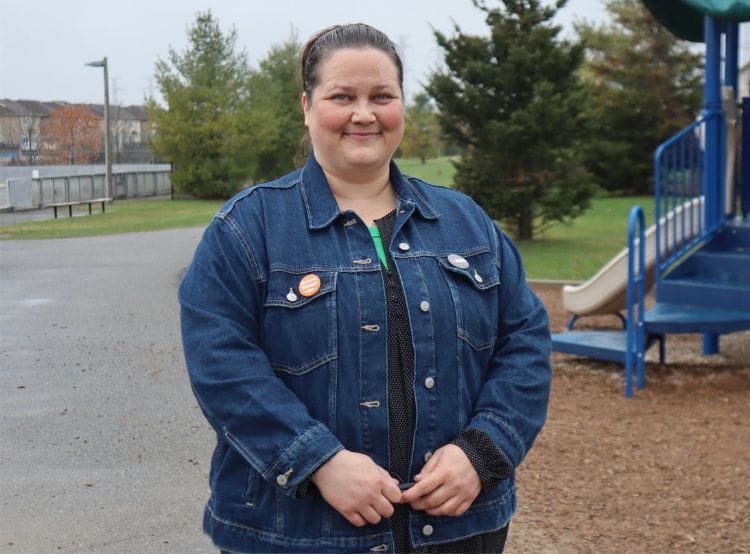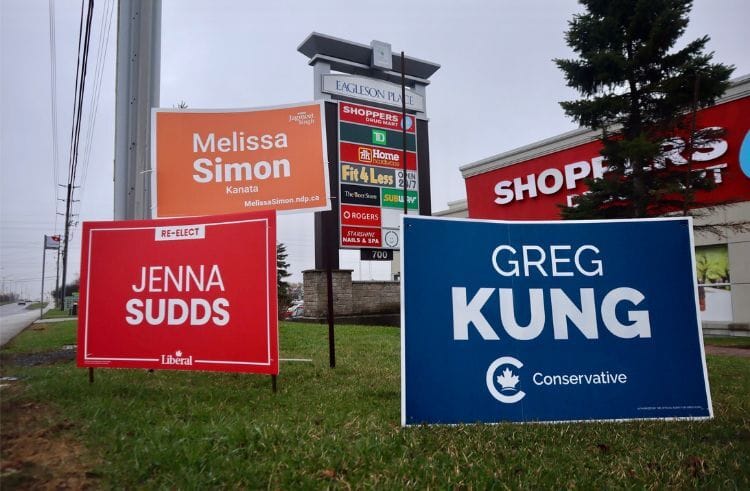When Ontario voters went to the polls just a few months ago, all eyes were on Kanata. The suburban riding currently has Liberal representation at both levels of government, but has gone blue in the past.
Kanata, then under different electoral boundaries, was Conservative until 2015 when Karen McCrimmon won the seat for the Liberals. She held it until 2021, when former Ottawa city councillor and Kanata North Business Association executive director Jenna Sudds carried the seat following McCrimmon’s decision not to seek re-election.
Polling projections on 338 Canada show a heavy lead for the Liberals with Sudds taking 52 per cent of the vote. Conservative candidate Greg Kung is in second place with 38 per cent, and NDP candidate Melissa Simon is projected in third with six per cent.
Speaking to the Lookout, Sudds said she’s hearing a lot of concerns over U.S. President Donald Trump, but also the affordability crisis.
“Affordability continues to be a challenge, so making sure we put in place policies like removing the consumer carbon price, reducing income tax by one percent. These are measures that will have a concrete impact for people here in Kanata, she said. ”Above and beyond that, of course, affordable housing continues to be a discussion point. We are working with organizations like Ottawa Community Housing that have a plan not too far from here to expand their seniors building here just off Terron. There are more affordable units that are planned to have Campeau just up the street.”

Jenna Sudds is the Liberal incumbent candidate in Kanata. Photo by Charlie Senack.
Conservative candidate Kung said he wanted to run in politics because of the “failed health drug, and crime policies” he’s seen from the Liberal government in his role as a paramedic in the Ottawa Valley.
“We've put forward what we've proposed to call the Blue Seal Program. Right now while we're speaking, there are around 20,000 trained doctors who are sitting at home not working in healthcare. There are probably around 35,000 nurses not working in healthcare. And part of the problem we see is that people don't have a family doctor,” Kung told the Lookout.
“The Blue Seal Program seeks to create a standardized credential system that allows people to get recognized within 60 days and work with the provinces and territories that expedite that process so that they can actually start getting plugged into the system a little bit faster,” he added. “We've made a promise that by 2030 we'd like to have 15,000 more doctors in communities across the country.”
Kanata NDP candidate Simon has lived in the riding for 20 years and said she decided to put her name forward after getting to know more of what the party stands for.
In the last federal election the Kanata NDP took 14 per cent of the vote — their best turnout yet. Provincially speaking, they lost by only about 1,800 votes in a 2023 by-election.
Currently, the NDP are not doing well in national polls. But Simon said people should give them a chance.
“I've had many individuals say, look, I really support you, I support the NDP, I'm voting strategically this election. That's unfortunate because it doesn't reflect the amount of support we actually do have,” Simon told the Lookout.

Melissa Simon is the NDP candidate in Kanata. Photo by Charlie Senack.
Simon is encouraging people to vote for the candidate of their liking because it gives greater support for next time and can accomplish more as a result.
While knocking on doors, she said the biggest issues impacting Kanata are affordability and housing.
“We have four young adults and late teens living at home who, when tried to move out, and were renovicted from an apartment and is now back home. There just isn't a plan to find another place to live because there isn't any,” said Simon, who also noted the importance of more affordable housing.
“I think when we're looking at affordable housing for this area, we need to consider the needs of all of our residents, so that is families, but that's also seniors who may want to downsize,” she said. “We need to consider greenspace as well. None of us want or would be healthy living in an industrial-style, multi-apartment complex without green space.”
The City of Ottawa has been desperate to get more transit funds from upper levels of government. In January, it was announced $180 million would flow from the feds over 10 years. While Sudds was in support of the funds, she also said it was the city’s responsibility to get its own affairs in order.
“The residents of Canada are taxpayers at all levels, right? And certainly deserve to have reliable public transit as everyone in Ottawa deserves,” said Sudds. “Operational transit funding is not within a federal realm and the city really needs to look to the province and within their own proffers to ensure that. But we are making investments to ensure they can upkeep on their transit fleet and make those necessary investments.”
Mayor Mark Sutcliffe has also been pleading for more payment in lieu of taxes, which the federal government pays instead of taxes for federally-owned office buildings. Over the last three years, the payments have decreased and the city says it will add up to $140 million over the next decade.
A federal court rejected the city’s argument and Justice Panagiotis Pamel said, “Ottawa seems to be trying to fit a square peg into a round hole on the coattails of statutory intent and purpose,” and found “nothing unreasonable” about how much was paid.
Sudds says she supports that decision. The city is launching an appeal.
Back on transit, NDP candidate Simon says she’d like to see the federal government step in to help ensure Stage 3 light rail out to Kanata gets built. During the provincial election Progressive Conservative Premier Doug Ford said the system would be offloaded to the province and committed to getting the extension built. That also means ensuring there is better service.
“If we are going to make sure we have access to affordable housing, deal with healthcare or economic issues such as making sure our tech hub is secure and doing well and thriving economically, it is also important that there is accessibility to those things,” said Simon. “And all of those things do rely on transportation. So the federal government can't step back too far.“

Greg Kung is the Conservative candidate in Kanata. X photo
Kung agrees. He said Kanata has one of the biggest industrial corridors in the city but there are no transit options out to more rural areas such as Carp. He also has concerns about the lack of transit options which go to the Kanata North tech park — the largest in Canada.
“If you've ever had to drive to the KNBA during rush hour, I do not advise it. We've heard directly from the people here that they want more public transit,” said Kung. “We need to connect people to their jobs a bit easier. They would have my full support to at least advocate for that. And if that requires federal funding, then that's something that I'd be definitely willing to advocate for.”
Another issue facing the Kanata North Business Park is the threat of U.S. tariffs. Kung says what he’s hearing from businesses is that they feel Canada is becoming a less competitive market.
“When the Liberals increased the capital gains tax last year, many of them lost some of the investors that they had previously been accumulating because they were scared of what a negative tax regime could do to stifle entrepreneurship and innovation,” he said. “The Conservatives have talked about removing capital gains taxes altogether if companies reinvest back here in Canada. When we're talking to some of these startup guys, they're super excited because maybe they can invest more. Maybe take some bigger risks. Maybe grow the company faster.”
Sudds said tariffs are also a concern she’s been hearing. Earlier this year, when talks of the taxes started, she held a round table with tech leaders to hear their concerns and ideas.
“I will tell you that the moment we are in right now, there's actually a lot of optimism in our tech leaders. I will say two things: one of which is the move that our prime minister has announced to have one Canadian economy, not 13. So, breaking down those internal trade barriers and labour barriers so there's more labour mobility,” said Sudds. “The other thing that is really exciting is as a government, the commitment to buy Canadian, to support our local businesses, our Canadian innovation. There were companies in this tech park who wanted the Canadian government as a first customer and we have that opportunity in front of us now.”




